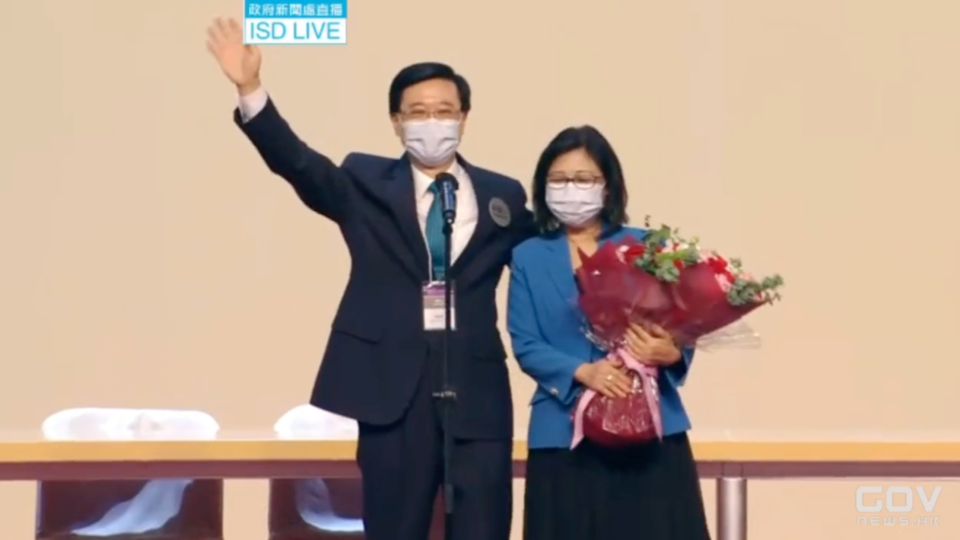Former chief secretary John Lee has been elected Hong Kong’s new leader after scoring 1,416 votes in a race in which he was the sole candidate and the only voters were members of the city’s election committee. Committee members’ only options on the ballot were “Support” or “Not Support”.
Lee will take office as the city’s chief executive on July 1 and serve for a five-year term, during which he had said he hopes to tackle tricky issues including deep-rooted housing problems and the implementation of a controversial local security law.
“I am very grateful to everyone for your support and encouragement,” said Lee on Sunday, who was joined by his wife on stage as he addressed his supporters and Hong Kong residents at the Hong Kong Convention and Exhibition Centre — which was broadcast on various channels — after receiving the election result.
“Today is also Mother’s Day, Buddha’s Birthday and Red Cross’s World Smile Day, so we can all be very happy and welcome such a historic day.”
The election committee went to the polls in the morning, with Lee needing 751 or more votes to seal the deal.
Hongkongers do not get to choose their leader by popular vote. Instead, the city’s chief executive is elected by a committee made up of representatives of different sectors, including politicians and members of the business community, but most being Beijing loyalists.
Electoral Affairs Commission chairman Barnabas Fung said 1,428 members of the election committee had cast their ballots, representing a turnout rate of 97.74 percent.
Lee received eight votes of no support.
Fung said there were four invalid votes.
Lee received more votes than Carrie Lam’s 777 in 2017 and Leung Chun-ying’s 689 in 2012, both of whom were chosen by smaller election committees consisting of around 1,200 members.
There was heavy security at the Hong Kong Convention and Exhibition Centre in Wan Chai on Sunday, where most voters cast their ballots, to ensure that the election would not be disrupted.
Local media had reported that as many as 7,000 police officers would be mobilized across the city for the election day.
Three members of the pro-democracy League of Social Democrats staged a demonstration on Sunday morning in Wan Chai near the main polling station, a rare sight after Beijing imposed the national security law in Hong Kong.
“Power to the people, universal suffrage now,” they chanted.
They were stopped by police from marching to the building.
The political party also issued a statement on Facebook, criticizing authorities for depriving the city’s 4.47 million voters of the right to vote.
Speaking to reporters after the announcement of the result, Lee said, “With loyalty and perseverance, I shall undertake this historic mission and shoulder this responsibility to unite and lead the 7.4 million Hong Kong people to start a new chapter together.”
“Having restored order from chaos, it is high time that Hong Kong starts a new chapter of development, a chapter that will be geared towards greater prosperity for all,” he added.
The pro-Beijing Democratic Alliance for the Betterment and Progress of Hong Kong congratulated Lee on the result, adding they have high hopes for the chief executive-elect to “comprehensively, accurately and firmly uphold the ‘one country, two systems’ principle and the Basic Law, implement the principle of patriots governing Hong Kong, lead Hong Kong… to actively cooperate with the country’s development.”
Lee faces major challenges entering office, with the city still deeply divided following the social unrest that enveloped Hong Kong in 2019 and 2020 sparked by a now-withdrawn controversial extradition bill, which Lee was a major proponent of.
Before being elected the city’s leader, he was the deputy commissioner of police and the secretary for security who oversaw the police’s controversial handling of the protests, which has led to questions about whether he is suitable to lead the city at this time.
Lee had responded by saying he would work to create more opportunities for young people and give a second chance to those arrested during the protests.
He had also said that one of his first priorities after taking office would be enacting Article 23 of the Basic Law, the city’s mini-constitution.
Article 23 requires the city to enact laws on its own to prohibit any act of treason, secession, sedition, and subversion against the Chinese government, or theft of state secrets, to prohibit foreign political organizations or bodies from conducting political activities in the region, and to prohibit political organizations or bodies of the region from establishing ties with foreign political organizations or bodies.
The government attempted to introduce such a bill in 2003, but it was shelved following mass protests.
Separate from the national security law, Article 23 also covers treason, theft of state secrets, and the political activities of foreign political bodies in Hong Kong.
Another key policy Lee has discussed is shortening the average waiting time for general applicants wanting to acquire a public rental flat in the city
In his manifesto, he said he would achieve this by exploring a new scheme that would allow people, who are willing, to move into one or two blocks of a public rental housing estate before all supporting facilities in the neighborhood are completed, which he said would reduce wait time by about a year.




